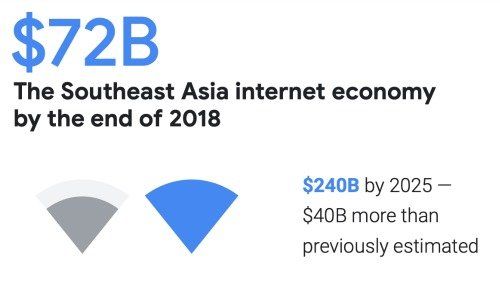Temasek and Google: Fundraising Surges
The internet economy of Southeast Asia experienced a dramatic surge in fundraising over the last four years, according to the latest joint report released by Temasek and Google.
Internet economy companies in Southeast Asia (ASEAN) received more than $9.1 billion in funding during the first half of 2018, nearly as much as in the whole of 2017, according to the Google-Temasek e-Conomy SEA 2018 report, released on Monday.
With the total capital raised adding up to $24 billion in less than four years, Southeast Asia is progressing ahead of schedule towards the goal of attracting $40 to $50 billion worth of investments required to build the internet economy by 2025.
Nine Unicorns
«Most of the funding went to Southeast Asia's nine unicorns, with Grab being the first decacorn,» said Rohit Sipahimalani, joint head of portfolio strategy & risk group at Temasek during a press briefing. A decacorn is a new breed of startup valued at $10 billion and above.
Southeast Asia’s nine internet unicorns, Bukalapak, Go-Jek, Grab, Lazada, Razer, Sea Group, Traveloka, Tokopedia, and VNG, have received the majority of it, attracting $16 billion of the $24 billion invested in the region, the report's findings showed.
Internet Economy Revised Up
In the third edition of the report, Temasek and Google revised the size of the region's Internet economy to $240 billion, from $200 billion in the previous report. When asked if anti-competition laws and tighter regulations could make it harder for new companies to compete with existing unicorns, and stifle their growth, Rajan Anandan, managing director for Google Southeast Asia and India does not think so.
«I think we will see a couple more unicorns given the huge potential of the market,» said Anandan.
Fintech Getting More Attention
Investments in nascent sectors of the internet economy not yet covered in the e-Conomy SEA research from a monetization standpoint, including Education, Fintech, Healthcare, and others, added up to $3 billion since 2016. They have also experienced a dramatic surge in the first half of 2018, when they grew 4 times from a year earlier.
Among these sectors, Fintech was by far the most dynamic, attracting over $500 million of investments in the first half of 2018 alone, more than twice as much as in all of 2017. Fintech funding went to more than 300 startups in the region, primarily through Seed and Series A deals, highlighting the race to unlock the huge opportunities in this financial services space.



























